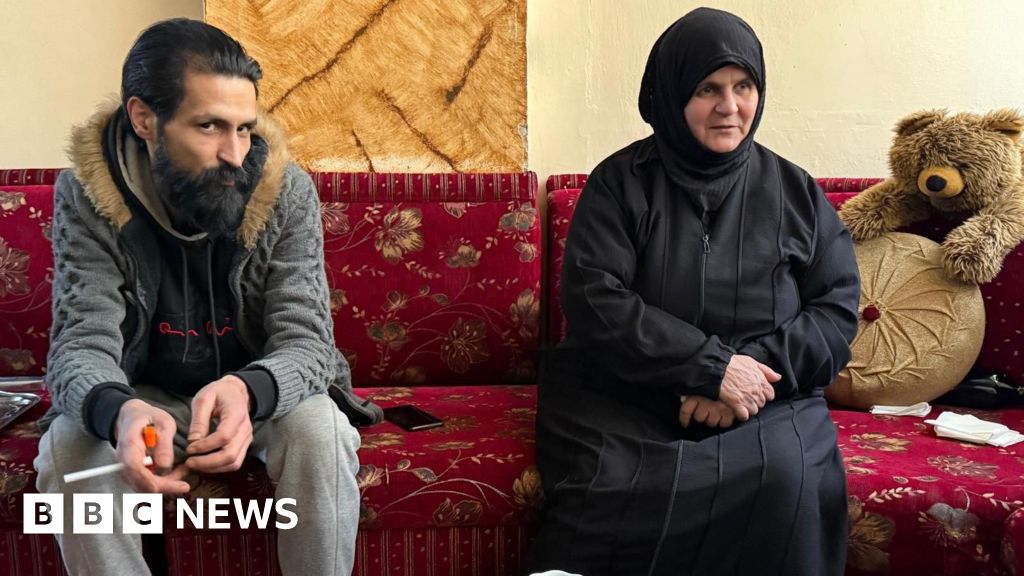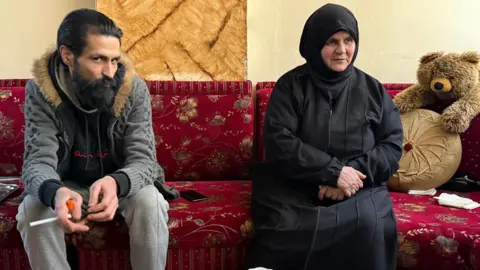 BBC
BBCThe brand new Syrian authorities promise justice for crimes below the Assad regime. Nevertheless it’s a tall order, with many having suffered losses of each form within the civil struggle. Sebastian Usher met individuals in Damascus for whom justice is vital to how they see Syria’s future.
On the sting of Douma, one of many Damascus suburbs most devastated by the struggle, in a shrouded lounge subsequent to a range, Umm Mazen recounts the 12 years she desperately sought information of two of her sons, who had been arrested within the first years of the rebellion and civil struggle, and swallowed up within the Assad-era safety system.
For her oldest son, Mazen, she lastly obtained a dying certificates, however for Abu Hadi, no hint of him has ever been divulged.
Her third son, Ahmed, spent three years within the safety system, together with eight months within the pink block for political prisoners in that byword for brutality, Saydnaya jail.
His entrance enamel stoved in by a torturer’s hammer, he remembers one second when he believes he heard his brother Mazen’s voice answering a roll name in the identical jail, however nothing extra.
What justice does Umm Mazen search for the destruction of her household?
“There must be divine justice, coming from God,” she says.
“I noticed some native males bringing a shabiha (an armed regime supporter) to be killed.
“I instructed them: ‘Do not kill him. Somewhat, torture him precisely the identical method he tortured our younger males’.”
“My two youngsters died – or in all probability have died, however there are millions of different younger males who had been subjected to torture.
“I pray to God that Bashar [al-Assad] stays in a dungeon underground and that Russia, which used to guard him, can not help him.
“I pray to God to place him someplace underground and that he’s left in oblivion – simply as he left our younger males in his jails.”
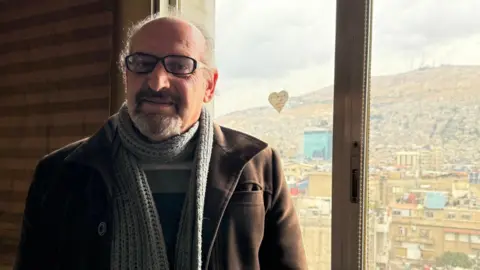
Lawyer Hussein Issa sought justice for dozens of individuals accused of political crimes below the Assads.
He confronted fixed stress from the authorities over his advocacy, however endured and managed to avoid wasting of his purchasers from being crushed below the wheels of the safety system.
However for these assigned to the particular terrorism courts, there was normally nothing that might be completed.
The terrorism legislation loomed ever extra darkly over Syria because the civil struggle continued.
Now, with the mountain on the sting of Damascus glimpsed by means of the window of his scruffy, smoke-filled workplace, the 54-year-old lawyer says he believes that lots of the judges who had been complicit with the Assad regime must be kicked out and authorized motion taken towards them.
However others from that period, he says, might nonetheless play a job within the new judiciary.
As for the massive problem of attempting to ship retrospective justice for the horrors of the previous 50 years, Mr Issa says that establishing a judicial system able to that is an important process for Syria’s new authorities.
“If this method is just not good, the way forward for the brand new state shall be grim.
“We do not know the way dangerous it might then get. We’re already afraid that some events might trigger strife and battle.
“If we’ve got a powerful system and state, then we can’t be afraid of this stuff.
“If we do not have them, we shall be fearful. Nevertheless, since I am optimistic by nature, I feel the brand new regime will certainly be higher.”
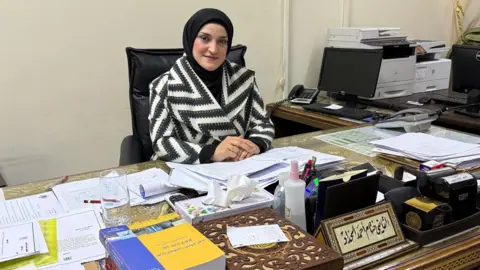
The monumental constructing within the Syrian capital the place the justice ministry is situated has been in suspension for a number of weeks after the autumn of Assad.
Now, clusters of legal professionals have gathered within the lifts and corridors forward of the reopening of the civil and legal courts.
In her fifth-floor workplace, the Deputy to the Minister of Justice, Khitam Haddad, says that legal and civil circumstances will as soon as once more be handled, however the process of coping with the crimes dedicated below the earlier regime won’t be tackled for now.
Along with her massive, heavy desk coated in official papers, she says she’s been working as a decide since 2013.
She was appointed deputy justice minister in 2023. For now, she stays in place.
“I felt a private duty in regards to the matter,” she says.
“It’s vital for the work to proceed, for the judges to return to their work and for the courts to return, as a result of as a Syrian I need my job to proceed and I need this victory to proceed, so that folks don’t have anything to be afraid of.
“I wish to ship actual and sensible messages of reassurance, not simply speak.”
However some legal professionals are already involved over a transfer by the transitional authorities to ascertain a council to supervise the Bar Affiliation with out placing it to a vote.
In a petition, they stated such an strategy would change one type of authoritarianism with one other.
For now, the legal guidelines and judicial construction of the Assad period stay in place, together with the terrorism legislation.
It might be a very long time earlier than the circumstances of any of these accused of crimes below the ousted regime are dropped at trial.
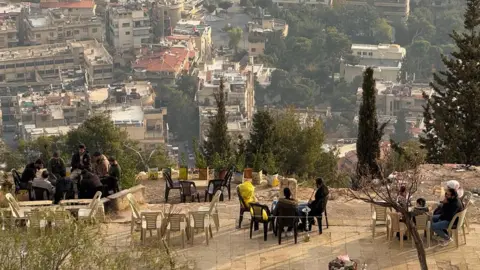
The brand new authorities have instructed Syrians to not take issues into their very own palms, as movies have circulated of brutal abstract justice being meted out to some former officers.
There have been raids and arrests – and a few of those that escaped throughout the border to Lebanon or Iraq have been returned.
However there stays a giant query over whether or not the justice system – which was for thus lengthy an instrument of repression – is able to being reconfigured to tackle this immense ethical and logistical problem.
Excessive up on the mountain above Damascus, Syrians, younger and previous, are for now nonetheless respiration free – intoxicated by the chilly clear winter air – in a spot they had been banned from coming into by the safety forces for greater than a decade.
At cafes and kiosks which have sprung up within the weeks for the reason that overthrow of Assad, they stare down on the metropolis unfold out earlier than them – with each its darkish reminiscences and the promise of a distinct future, through which justice and accountability would possibly simply be allowed to play a component.

